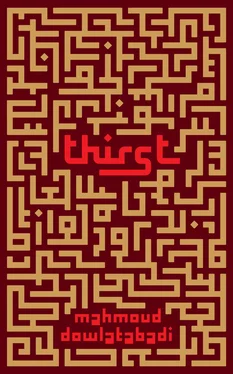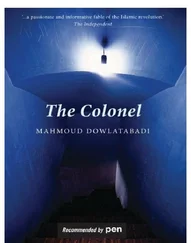Earth, earth, water, water, water beyond the Shatt al-Arab, streams flowing on this side and the far side of the Shatt, a quiet city, houses in darkness and people breathing. People who are alive. But not necessarily. We cannot know what sort of lamp the other author behind the black curtains is using as the source of the weak light that illuminates his small kitchen table. A lantern or a hurricane lamp; a kerosene lamp or a candle? A candle for sure, a dim light; just enough to illuminate a white sheet of paper, which absorbs the light from the candle, stuck on a terracotta plate. The candle flame is flickering a bit, like in days of old, making the author appear like those ancient scribes who copied even older manuscripts: manuscripts in Kufic script, rewritten in Naskh. ‡They developed hunched backs, those scribes, with their necks and shoulders constantly bent over, while the light of their eyes grew dim from early on, setting them on the inevitable path to blindness; and even if they didn’t go completely blind, their sight would gradually diminish. They spent their time copying books for the libraries of some caliph or emir or other, which in all probability were seldom read — such a difficult and strenuous task, one wonders what prompted them to take it up in the first place! Sitting crouched on a small carpet, with one knee laid flat on the ground and the other bent in front of them, their notebooks balanced on the upright knee and the reed quill held in their right hand, one pot of black ink and one pot of purple, with quills and quill cases next to the inkpots on a wooden tray or a plank — scribbling away incessantly until their lives came to an end!
At this moment, that other author, who has been cast unexpectedly back into the past, is sitting not on a carpet or beside a wooden tray containing his writing materials, but instead, at a kitchen table, on a bamboo chair. Sweat, brought on by the intense heat, has soaked his head and neck, his chest and his armpits too, and the electric fan on the ceiling isn’t working because the city’s power is out. Now and then, he wipes the sweat off his brow and from round his neck with a handkerchief he has placed on the table, and then pauses for a moment, resting his forehead on the pad of the handkerchief clasped in his left hand and closing his eyes, while a comfortable Lamy fountain-pen lolls between the fingers of his right hand. He has marked the end of the last paragraph he wrote with a full stop and is about to move on to the beginning of the next line. He half-opens his eyes and glances at his sleeping family. His mother, his wife and their children. There they all are, sleeping peacefully — lucky for them, he thinks, that they are sleeping so soundly, blissfully unaware that in retribution for the missiles and bombs that have been unleashed upon the other side’s cities, a bomb or missile might drop at any moment from the sky and fall directly on the roof of their house, burying them in a hole in the ground. No, on reflection, he decides nothing of that sort is going to happen and stretches out his hand to pull a single cigarette from the packet, puts it between his lips and reaches for the matchbox when he suddenly recalls that, in amongst all the reports of his country’s battles and battlefield gains, he may have seen an item somewhere — was it in the newspapers, on the radio or on television? — about the risks of passive smoking. And so he keeps the unlit cigarette between his lips for a few moments, rolls it around his mouth and thinks of smoke, fire — the smoke behind the hill and the front-line trench, or the trenches in which the characters of his story are lying hidden, behind a protecting barrier of sandbags. He sees the commander of the reconnaissance regiment suddenly stubbing out his half-smoked cigarette on the trench wall and cursing everything that goes by the name of ‘air force’ in armies all around the world. ‘Get down!’ he yells, flinging himself into a hand-dug ditch; crouching there, all he can hear is explosions, screams and then more explosions near the base of the hill. He can feel the ground shaking, and the dirt crumbling from the walls of the trench onto his back and shoulders. The airstrike is heavy and the corporal is certain that after such an assault, his line of communication with his HQ behind the lines will have been cut. Twenty-four hours at least will be needed to remove all the corpses, and to regroup and plan a counterattack. So, on a sudden impulse, the other author at the kitchen table lights up his cigarette and writes: ‘Under no circumstances should prisoners be killed! They are your captives, and are completely in your charge.’
‘But you killed him! Why can’t you keep your nerves under control?’
‘Look behind you! Their charred bodies are still lying there. A whole company of our men has just been wiped out. Either incinerated or simply evaporated into thin air! Can’t you see?’
‘I’m not blind, of course I can see what’s happened.’
‘Jumped for joy and whooped, he did, when they bombed us; you didn’t hear him, but I heard him alright; I was standing right next to him!’
‘What about the other one? Him!’
‘He’s still alive. But he’s fatally wounded. And no, he won’t be able to stick a bayonet in my back, ’cos I’ve tied both his hands. He’s lying somewhere over there. Where are we going to get water from now?’
‘There’s water down there. In that same water tank I’ve been defending against their attacks all day. I shot their last water-carrier — riddled his flasks with bullets and blew them up. And if any more of them try to fetch water, then I’ll send them to join their dead brothers. Anyone making for the tank is plumb in my line of sight. Of course, they might all go mad from thirst and try and rush the tank. If they do that, I’ll open up on them with the machine gun. But as for now, heave the one you killed out of the trench and roll him down the hill. If we keep him in the trench with us till tomorrow, he’ll start rotting in the heat of the sun. Give him a good shove, we may have to stay here for some time yet.’
‘What?’
‘What other choice have we got? We’ve got to stay here until help arrives; at least until we can get some bread and water.’
‘Ah … water; bread and water. Yeah, if they hadn’t hit our own water bowser I’d sneak over there under cover of darkness and bring us back some water and food. But … but what now? Are we just gong to sit here and wait for their pincer attack?’
‘Don’t tempt fate! They don’t have the energy. Our forces gave them a real pounding up there a while ago. I don’t see them standing tall, either. They’re in the same boat as us.’
‘But yesterday …’
‘You mean earlier today, don’t you? Or what’s the time — I’ve lost track …’
‘One in the morning. I do mean yesterday after all.’
‘Alright. Calm down and let’s see what we can do. What about the other trenches? Any sounds, any voices?’
‘Not a peep. Silent as the grave.’
‘Go and find us some water, even a single water bottle will do … Look at the stars!’
That was what he wrote, the other author, before glancing up at the clock in the wall niche. He couldn’t make out what it said, so he removed the spectacles he wore to correct his short-sightedness from the bridge of his nose. Now he could make it out; the clock’s hour hand was approaching one in the morning. But as he sat watching it, the second hand jumped! It skipped a second, and then another … and suddenly it seemed to be whizzing round ever faster by the moment. He wondered if this was even possible? Can time speed up at ground level? It wasn’t like flying in a plane from one continent to the other; or like the velocity of a missile being fired from its launcher. This was pure time: time in the sense of time passing heavily and ponderously beneath the humid heat of the ceiling above his head as he smoked his cigarette, blithely ignoring the television’s daily warnings about the dangers of smoking. No, what he was driving at was the true sense of time in its monotonous and fateful onward march. Or maybe he meant time in the sense of the corrosive dread that afflicted him, me and all of us; he imagined his children, right then immersed in their deep, innocent sleep, suddenly growing old and circling his coffin, placing his notebook and Lamy fountain pen beside his casket and intoning laments for him. Yes, that was what he was really talking about: time as a surgical procedure! Slicing away and discarding a horrific future from life, like an appendicitis operation. What a brilliant thought! He put his spectacles back on the end of his nose and stared at his final sentence. ‘Look at the stars!’
Читать дальше












